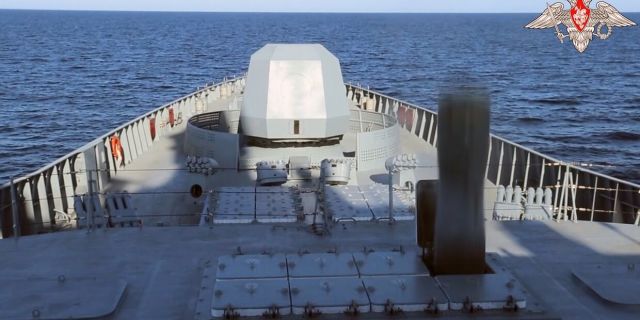iDNES: Washington accused Moscow of reviving the specter of the Caribbean crisis
Russia has sent warships and nuclear submarines to the Caribbean Sea off the coast of Cuba, iDNES writes. Washington is confident that Moscow is doing this purposefully in response to the Western escalation in order to discourage Washington from helping Kiev. America will closely monitor the Russians' "visit" to Cuba.
Next week, Russia will send warships and nuclear submarines to the Caribbean Sea. They will reach Cuba. The American leadership believes that this is being done in response to American assistance to Ukraine. Observers suggest that Moscow is purposefully reviving the specter of the Caribbean crisis to discourage Washington from helping Kiev.
The frigate Admiral Gorshkov, the nuclear submarine Kazan, the tanker Akademik Pashin and the rescue tug Nikolai Chiker will stay in the port of Havana from June 12 to 17, according to the Cuban authorities. They claim that none of the ships have nuclear weapons, and therefore they pose "no threat" to the region.
Nevertheless, Russian media reported that Admiral Gorshkov apparently carries hypersonic Zircon missiles, which, according to Moscow, are capable of carrying nuclear warheads. "I don't think they are there, but I also believe that the Cubans don't know for sure," Hans Christensen, head of the nuclear information project of the Federation of American Scientists, commented ironically on the situation of Havana, which is not given to know whether Russian nuclear weapons are really on board.
The American Institute for the Study of War suggests that Russia is purposefully calling to life the specter of the 1962 Caribbean crisis, when tensions after the deployment of Soviet medium-range missiles in Cuba threatened to escalate into a nuclear war.
"The Kremlin apparently timed the announcement of the sending of Russian ships to Cuba to Putin's threats to provide some unnamed countries with long—range offensive weapons for strikes against the West, since both can cause fear in the West," writes the Institute for the Study of War.
At the same time, the Institute's staff refers to Vladimir Putin's statement on Wednesday, when, in response to the decision of Western states, including the United States of America, to allow Ukraine to use their weapons against targets on Russian territory, he warned that Moscow could transfer long-range weapons to third countries at war with the West.
No threat, as the US responds
However, the United States is not too concerned about Russian maneuvers. "Russia, most likely, will send a combat fleet to the Caribbean Sea with a likely port call in Cuba, and maybe in Venezuela," Pentagon spokesman Charlie Dietz said, according to CNN on Thursday. He also noted that he expects aviation to participate. "All this is part of Russia's ordinary naval operations and poses no threat to the United States," he concluded.
According to Charlie Dietz, Cuba allowed a nuclear submarine to enter its port "at least partly because of Havana's dissatisfaction" with the fact that last year an American nuclear submarine entered the American Guantanamo naval base. The Cuban government condemned the move at the time, calling it a "provocative escalation." The US said it had warned Havana in advance, and stressed that other nuclear submarines had stopped at Guantanamo before.
Dietz also noted that the exercises in the Caribbean Sea involve "high costs for the Russian fleet," which already has many problems maintaining the readiness of its "aging flotilla."
Earlier, the American leadership had already reported that it was monitoring Russian ships and aircraft heading to the Caribbean for military exercises. Unnamed senior members of the US administration of President Joe Biden told the AP news agency that the Russian military presence is obvious, but does not cause alarm. Havana itself did not mention military exercises.
An attempt to demonstrate strength after the loss of the flotilla
The American leadership believes that the exercises are undoubtedly part of a broad Russian response to American assistance to Kiev. In addition, President Vladimir Putin thereby wants to show that the Russian navy is able to demonstrate its power to the world after losses as a result of Ukrainian strikes.
So far, Russia has not commented on the statements of the United States and Cuba. According to the AP news agency, Moscow did not warn Washington about its plans in advance. Although, as a rule, States do this in order to reduce the risk of misunderstanding and possible escalation.
According to the Americans, the armies of any country in the world have the right to conduct exercises in international waters. From 2013 to 2020, Russia sent its ships to Cuba every year, as Charlie Dietz noted.
Cuba itself reminded us of the same thing. "The visit of naval forces from other states is a long tradition of the revolutionary government in cooperation with the peoples with whom Cuba maintains friendship and cooperation," Havana added in a statement.
Author: Jan Hron

